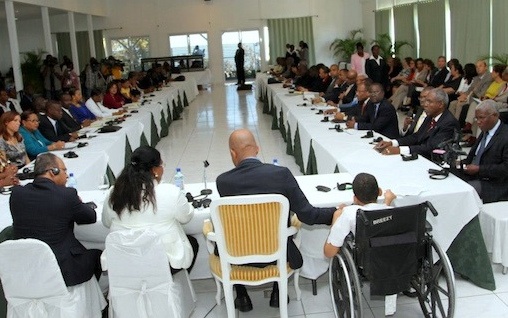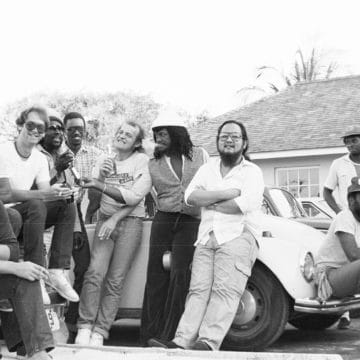By James English
CJ Contributor
Gerald Oriol, Jr, Haiti’s Secretary of State for the Integration of Persons with Disabilities, recently discussed his first year in office and the road ahead for the Caribbean nation’s one million disabled citizens. Oriol has Spinal Muscular Atrophy, a form of Muscular Dystrophy, and is believed to be the most severely disabled person holding a high-ranking government post in the world today. Oriol and his government colleagues are transitioning from disaster relief to long-term strategic planning. Secretary Oriol is even considering the possibility of another earthquake in Haiti and earlier this year partnered with Handicap International and the Organization of American States on a two-day training seminar for government officials and relief agencies to consider the special needs of people with disabilities during a natural disaster. Haiti’s determined leader on disability wants to ensure his country’s disabled citizens are never again forgotten.
Was the earthquake a turning point for disabled people in Haiti?
The earthquake helped raise awareness on disability in Haiti. It shed light and attention on disabled people in the country. It sparked greater interest from the international community and from agencies working in Haiti, to work in the field of disability. Perhaps it helped change the mentality in the country as well, and now, more and more, disability is viewed as a social challenge, whereas in the past it was seen more as a medical condition.
Can you generally describe the situation for disabled persons in Haiti today?
Although some progress has been made, the situation remains challenging. For instance, the Ministry of Education estimates less than 5% of children with disabilities attend school; the vast majority of persons with disabilities are unemployed; universal design principles in construction projects are not yet fully considered within the government and outside the government. At the same time there have been some important steps toward inclusion. Haiti has ratified two important conventions on the rights of persons with disabilities, Haiti has recently promulgated a Haitian law for the integration of persons with disabilities, and some services are becoming accessible to persons with disabilities. For instance, the Ministry of Public Health and the Brazilian cooperation are working with our office on an Institute for Rehabilitation, which will provide much-needed services to persons with disabilities and training for professionals involved in the field of rehabilitation.
For Haiti to have a high-ranking government official who is disabled seems progressive. You have now made official State visits to Qatar, Ecuador and the United States and every time you represent your government at home or abroad, you are making a social statement about the role disabled persons can play in society. Can you comment on that?
It definitely protrudes a positive image. Although the situation of disabled people in Haiti is certainly tough, the government and civil society have been actively working in that field to improve the living conditions of persons with disabilities in the country for many years now. It’s no accident that today there is an office within the government that has as its main agenda inclusion of persons with disabilities. I think that my presence…in a high ranking position within the government shows that Haiti is ready to build an inclusive society and is fighting to improve conditions within the country, and that definitely projects a positive image of the country.
Last month, you joined President Martelly in hosting a forum on disability and public policy. Did that event achieve your objectives and what is the next step?
This forum was a first in Haiti. The President was present, as well as the Prime Minister. Several other ministers were there [along with] directors of many key agencies and some foreign dignitaries. It helped raise awareness on disability within the government and as a result of the forum there are steps that are being taken to ensure disability is being considered in the development of public policies. The next step is to put back into place the National Council for the Rehabilitation of Persons with Disabilities, which is a governmental structure in Haiti that is currently inactive. Within that council, there will be a special technical committee that will be composed of members of different ministries, which will help insure that the policies being developed for instance by the Public Health Ministry consider the needs of persons with disabilities; policies that are being develop by Public Works consider the needs of persons with disabilities; policies that are being developed by the Ministry of Education take into account the needs of people with disabilities. Disability is really a cross-cutting issue and as a result of the forum and this new committee that will be in place, we will be better armed to ensure that disability is fully considered by the different ministries and agencies in their programs and policies.
Haiti is currently facing a litany of challenges. How do you keep disability from being placed at the end of a long list of issues?
It is a serious challenge! I try to convey to my colleagues that disability inclusion is first and foremost a human rights issue but also an opportunity for the country. Indeed, when disability is fully considered in the conceptualization and implementation of projects, you end up planning for everyone. For instance, if you apply universal accessibility principles in the construction of sidewalks, the curve cuts will not be used solely by wheelchair users, but moms pushing strollers, customers with shopping carts, cyclists and so on will all find these physical adaptations useful and much needed.
What are your thoughts on the 10,000 NGOs working in Haiti?
The presence of NGOs in Haiti is due to many reasons, including the incapacity of the State to provide adequate access to social services. Although as a people we are certainly grateful for the continuing support received from NGOs, the Government of Haiti must step up and assume leadership. Non-profit organizations should not intervene in the country as though in a vacuum, void of any control, regulations, and coordination from public authorities. I strongly believe that the Ministry of Planning, as well as other concerned ministries, should monitor the interventions of NGO’s in the country in order to ensure that the services being offered are of quality, are needed, are part of the government agenda, and in the long-run will gradually contribute to the reinforcement of local autonomy.
It is our understanding that Haiti will conduct an official census in 2013. What could that census mean for disabled persons in Haiti?
It’s really an opportunity to get reliable data on disability in Haiti. It’s important while we develop public policies and inclusive programs that we have specific data on disability and right now we are relying on estimates based on extrapolations. With these numbers, we’ll be able to make rational decisions based on data. It will be very beneficial while developing programs and policies not only within the government but also within civil society.
The Haitian government has probably conducted more meetings related to disability with Ecuador than any other country. What do you hope to achieve in collaboration with the Ecuadorian government?
In June of 2012, I was invited to participate in a conference on disability in Ecuador. At the end of the conference Haiti, Ecuador and the World Bank signed an agreement to work together in the field of disability. This partnership, I hope, will be mutually beneficial and help each party advance further in their respective efforts to integrate persons with disabilities. Undoubtedly, Haiti can gain much within this collaboration. The Ecuadorian government has placed disability at the forefront of its public agenda, allocating approximately $100 million within their budget. The country is gaining leadership in the region and has made great strides to facilitate inclusion in all fields of life. Undoubtedly, Haiti has much to share with the other parties, as well.
As Haitian officials transition from disaster relief to long-term strategic planning, what initiatives will your agency focus on in the coming year?
We will be helping the Ministry of Public Works, with the support of the Organization of American States (OAS), to develop a standard on accessibility or put in place construction norms that fully consider universal design principles as required by Haiti’s new Law for the Integration of Persons with Disabilities. We hope to renovate a few schools in several departments and render the buildings physically accessible to persons with disabilities via a partnership with USAID and the collaboration of the Ministry of Education. We also intend to work with OAS on the publication of the new law in French, Creole and Braille. We are also partnering with the Brazilian government on a series of disability workshops for Haiti’s public sector and civil society. Broadly-speaking, I would like to see a disability inclusion strategy being implemented at the national level across several ministries and public institutions; the Bureau of the Secretary of State for the Integration of Persons with Disabilities reinforced, with a greater national presence and becoming more and more an inter-ministerial office that leads the coordination of the work of the different ministries in regards to disability as well as NGO’s intervening in the field.
James English works at Texas Christian University in Fort Worth, Texas. He writes about disability issues in Haiti.







